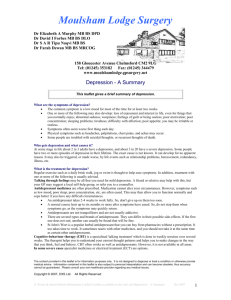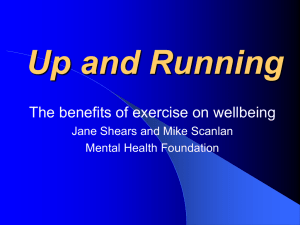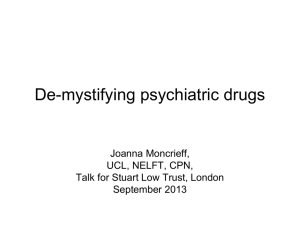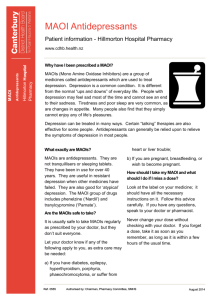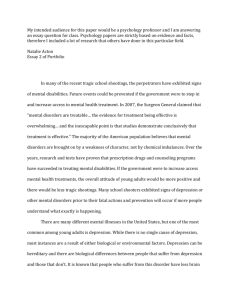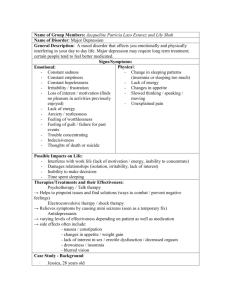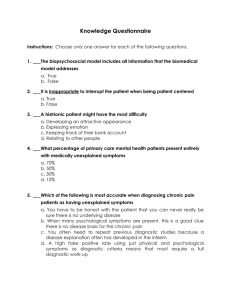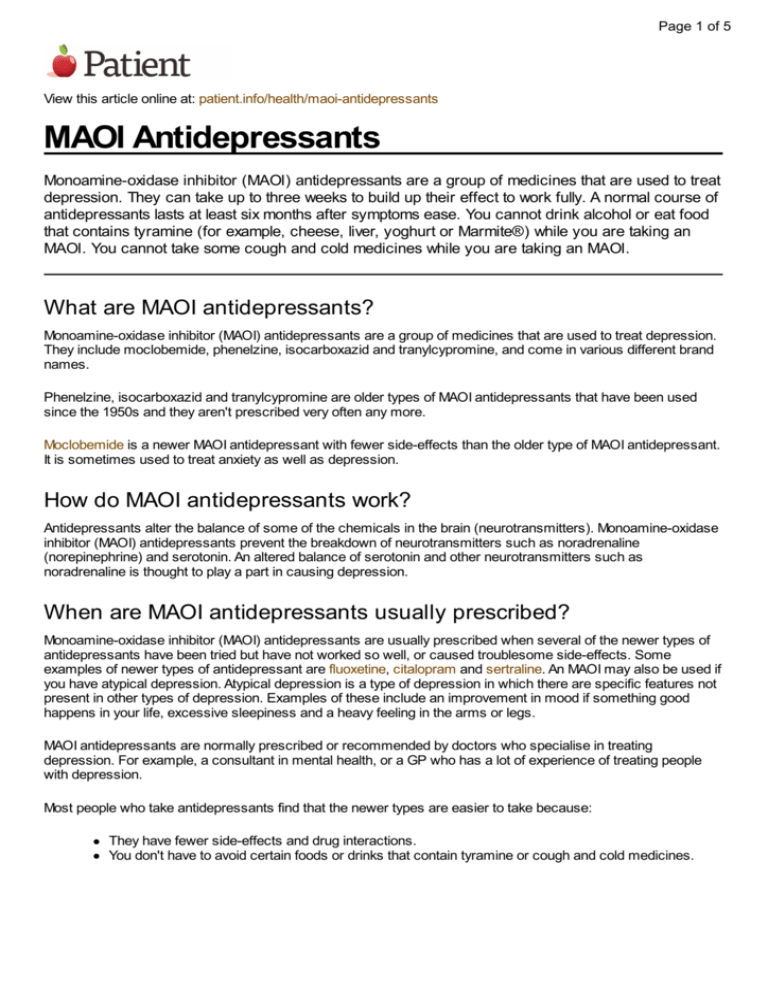
Page 1 of 5
View this article online at: patient.info/health/maoi-antidepressants
MAOI Antidepressants
Monoamine-oxidase inhibitor (MAOI) antidepressants are a group of medicines that are used to treat
depression. They can take up to three weeks to build up their effect to work fully. A normal course of
antidepressants lasts at least six months after symptoms ease. You cannot drink alcohol or eat food
that contains tyramine (for example, cheese, liver, yoghurt or Marmite®) while you are taking an
MAOI. You cannot take some cough and cold medicines while you are taking an MAOI.
What are MAOI antidepressants?
Monoamine-oxidase inhibitor (MAOI) antidepressants are a group of medicines that are used to treat depression.
They include moclobemide, phenelzine, isocarboxazid and tranylcypromine, and come in various different brand
names.
Phenelzine, isocarboxazid and tranylcypromine are older types of MAOI antidepressants that have been used
since the 1950s and they aren't prescribed very often any more.
Moclobemide is a newer MAOI antidepressant with fewer side-effects than the older type of MAOI antidepressant.
It is sometimes used to treat anxiety as well as depression.
How do MAOI antidepressants work?
Antidepressants alter the balance of some of the chemicals in the brain (neurotransmitters). Monoamine-oxidase
inhibitor (MAOI) antidepressants prevent the breakdown of neurotransmitters such as noradrenaline
(norepinephrine) and serotonin. An altered balance of serotonin and other neurotransmitters such as
noradrenaline is thought to play a part in causing depression.
When are MAOI antidepressants usually prescribed?
Monoamine-oxidase inhibitor (MAOI) antidepressants are usually prescribed when several of the newer types of
antidepressants have been tried but have not worked so well, or caused troublesome side-effects. Some
examples of newer types of antidepressant are fluoxetine, citalopram and sertraline. An MAOI may also be used if
you have atypical depression. Atypical depression is a type of depression in which there are specific features not
present in other types of depression. Examples of these include an improvement in mood if something good
happens in your life, excessive sleepiness and a heavy feeling in the arms or legs.
MAOI antidepressants are normally prescribed or recommended by doctors who specialise in treating
depression. For example, a consultant in mental health, or a GP who has a lot of experience of treating people
with depression.
Most people who take antidepressants find that the newer types are easier to take because:
They have fewer side-effects and drug interactions.
You don't have to avoid certain foods or drinks that contain tyramine or cough and cold medicines.
Page 2 of 5
How well do MAOI antidepressants work?
About 5-7 in 10 people with moderate or severe depression have an improvement in symptoms within a few
weeks of starting treatment with an antidepressant. However, up to 3 in 10 people improve with dummy tablets
(placebo), as some people would have improved in this time naturally. So, if you have depression, you are roughly
twice as likely to improve with an antidepressant compared with taking no treatment. But, they do not work in
everybody. As a rule, the more severe the depression, the greater the chance that an antidepressant will work
well.
Note: antidepressants do not necessarily make sad people happy. The word depressed is often used when
people really mean sad, fed-up, or unhappy. True depression is different to unhappiness and has persistent
symptoms (which often include persistent sadness). See separate leaflet called Depression for more information
about this condition.
How quickly do MAOI antidepressants work?
Some people notice an improvement within a few days of starting treatment. However, it may take up to three
weeks or more to build up its effect and work fully. Some people stop treatment after a week or so thinking it is
not helping. It is best to wait for 3-4 weeks before deciding if an antidepressant is helping or not. If poor sleep is a
symptom of the depression, it is often helped first, within a week or so.
When taking MAOI antidepressants
Some important considerations are:
Do not eat foods or drinks that contain tyramine.
Do not take certain other medicines.
Carry a special card at all times.
Rules when switching to other antidepressants.
Avoid tyramine
Do not eat food or drinks that contain tyramine (including alcoholic drinks) because this can cause a very large,
sudden increase in blood pressure (hypertensive crisis). This is very important if you are taking one of the older
MAOI antidepressants such as phenelzine, isocarboxazid and tranylcypromine. Hypertensive crisis is less likely
to happen with moclobemide, but you still cannot eat or drink large amounts of food and drinks that contain
tyramine.The first sign of a hypertensive crisis may be a throbbing headache.
Tyramine is found in cheese, liver, yoghurt, Marmite®, Oxo®, Bovril®, brewer's yeast, flavoured textured
vegetable protein, broad bean pods (the beans inside can be eaten), protein which has been allowed to age, or
ferment (for example, hung game, pickled herrings or dry sausage such as salami or pepperoni), fermented soya
bean extract and large amounts of chocolate.
Tyramine is also found in alcoholic drinks, including beer, lager or wine (especially red wine). It is best to avoid all
alcoholic drinks. It is also found in non-alcoholic beer.
Only eat fresh foods and avoid food that is stale or 'going off', especially meat, fish, poultry or offal while taking an
MAOI and for two weeks after you stop. This is because these foods may contain tyramine.
Other medicines that you may take
Monoamine-oxidase inhibitors (MAOIs) sometimes react with other medicines that you may take. So, make sure
your doctor knows of any other medicines that you are taking, including ones that you have bought rather than
been prescribed. Always check with your pharmacist before buying any medicines from the chemist or
supermarket to see if they are safe to take with an MAOI antidepressant. Some medicines that you can buy for
coughs and colds can also cause a very large sudden increase in blood pressure (hypertensive crisis), or make
you very excitable or depressed.
Page 3 of 5
In particular, avoid medicines for coughs and colds that contain dextromethorphan, ephedrine or
pseudoephedrine while you are taking an MAOI antidepressant and for two weeks after you stop it:
Dextromethorphan when taken with an MAOI antidepressant may make you very excitable or
depressed.
Ephedrine, pseudoephedrine and phenylpropanolamine when taken at the same time as an
MAOI antidepressant may cause very large increases in blood pressure.
Carry a card
If you are taking an MAOI antidepressant you will be given a small card that you must carry with you at all times.
This card lists the different foods, drinks and over-the-counter medicines you can't take. Always make sure you
show this card to anyone giving you medical treatment (for example, a doctor, a dentist, a pharmacist or a nurse).
If you change your antidepressant
If your doctor wants to change your medication from an MAOI to another antidepressant, you must leave two
weeks between stopping your MAOI antidepressant before starting your new antidepressant.
What are the possible side-effects?
Phenelzine, isocarboxazid and tranylcypromine
The most common side-effect with these older monoamine-oxidase inhibitors (MAOIs) is feeling dizzy when you
stand up (postural hypotension). It is more likely to happen if you are older. Less commonly, some people have
drowsiness, difficulty sleeping, headache, weakness and tiredness, a dry mouth, or constipation. Very rarely
these medicines can affect your liver - for example, jaundice has been reported and a few deaths from liver
reactions (but these are very rare). Peripheral neuropathy (weakness, cramps, and spasms, a loss of balance or
tingling, numbness, and pain) has also been reported very rarely.
Moclobemide
Common adverse effects include, sleep disturbance, and feeling sick (nausea). Less commonly, agitation and
confusion have been seen in people taking moclobemide.
Note: the above is not the full list of side-effects or interactions for these medicines. Please see the leaflet that
comes with your particular brand for a full list of possible side-effects and cautions.
Can I buy MAOI antidepressants?
You cannot buy monoamine-oxidase inhibitor (MAOI) antidepressants. They are only available from your chemist
with a doctor's prescription.
What is the usual length of treatment?
If you find that the treatment is helpful after 3-4 weeks, it is usual to continue. A normal course of antidepressants
lasts at least six months after symptoms have eased. If you stop the medicine too soon, your symptoms may
rapidly return.
Some people with recurrent depression are advised to take longer courses of treatment.
Who cannot take MAOI antidepressants?
It is normally recommended that you avoid taking monoamine-oxidase inhibitor (MAOI) antidepressants if you:
Have bipolar disorder and are in a manic phase.
Experience excitation or agitation as a major part of your depression (your doctor may prescribe a
sedative medication such as a benzodiazepine for 2-3 weeks).
Have had a stroke or any other condition that affects the blood supply to the brain.
Are taking other antidepressants.
Page 4 of 5
Have a growth on your adrenal gland (phaeochromocytoma) which can cause high blood pressure.
Have heart disease.
Are pregnant.
Are breast-feeding.
Are MAOI antidepressants addictive?
Monoamine-oxidase inhibitor (MAOI) antidepressants are not tranquillisers, and are not thought to be addictive.
(This is disputed by some people, and so this is a controversial issue. If addiction does occur, it is only in a
minority of cases.)
Most people can stop an MAOI without any problem. At the end of a course of treatment you should reduce the
dose gradually over about four weeks before finally stopping. This is because some people develop withdrawal
symptoms if the medication is stopped abruptly. If you have withdrawal symptoms, it does not mean that you are
addicted to the the medicine, as other features of addiction such as cravings for the medicine do not occur.
Withdrawal symptoms that may occur include:
Drowsiness.
Anxiety and agitation.
Sleep disturbance.
Vivid dreams.
Slowed speech.
A lack of muscle co-ordination.
Rarely, some people may have hallucinations and delusions.
These symptoms are unlikely to occur if you reduce the dose gradually. If withdrawal symptoms do occur, they
will usually last less than two weeks. An option if they do occur is to restart the medicine and reduce the dose
even more slowly.
How to use the Yellow Card Scheme
If you think you have had a side-effect to one of your medicines you can report this on the Yellow Card Scheme.
You can do this online at the following web address: www.mhra.gov.uk/yellowcard.
The Yellow Card Scheme is used to make pharmacists, doctors and nurses aware of any new side-effects that
medicines or any other healthcare products may have caused. If you wish to report a side-effect, you will need to
provide basic information about:
The side-effect.
The name of the medicine which you think caused it.
The person who had the side-effect.
Your contact details as the reporter of the side-effect.
It is helpful if you have your medication - and/or the leaflet that came with it - with you while you fill out the report.
Further help & information
Depression Alliance
9 Woburn Walk, London, WC1H 0JE
Tel: (Voicemail) 0845 123 2320
Web: www.depressionalliance.org
Mental Health Foundation
Web: www.mentalhealth.org.uk/
Page 5 of 5
Mind
15-19 Broadway, London, E15 4BQ
Tel: (Infoline) 0300 123 3393, (General) 020 8519 2122
Web: www.mind.org.uk
Further reading & references
Depression; NICE CKS, August 2013 (UK access only)
Depression in adults; NICE Clinical Guideline (October 2009)
British National Formulary
Disclaimer: This article is for information only and should not be used for the diagnosis or treatment of medical
conditions. EMIS has used all reasonable care in compiling the information but make no warranty as to its
accuracy. Consult a doctor or other health care professional for diagnosis and treatment of medical conditions.
For details see our conditions.
Original Author:
Jenny Whitehall
Current Version:
Dr Laurence Knott
Peer Reviewer:
Dr John Cox
Document ID:
13730 (v3)
Last Checked:
20/10/2014
Next Review:
19/10/2017
View this article online at: patient.info/health/maoi-antidepressants
Discuss MAOI Antidepressants and find more trusted resources at Patient.
© EMIS Group plc - all rights reserved.

